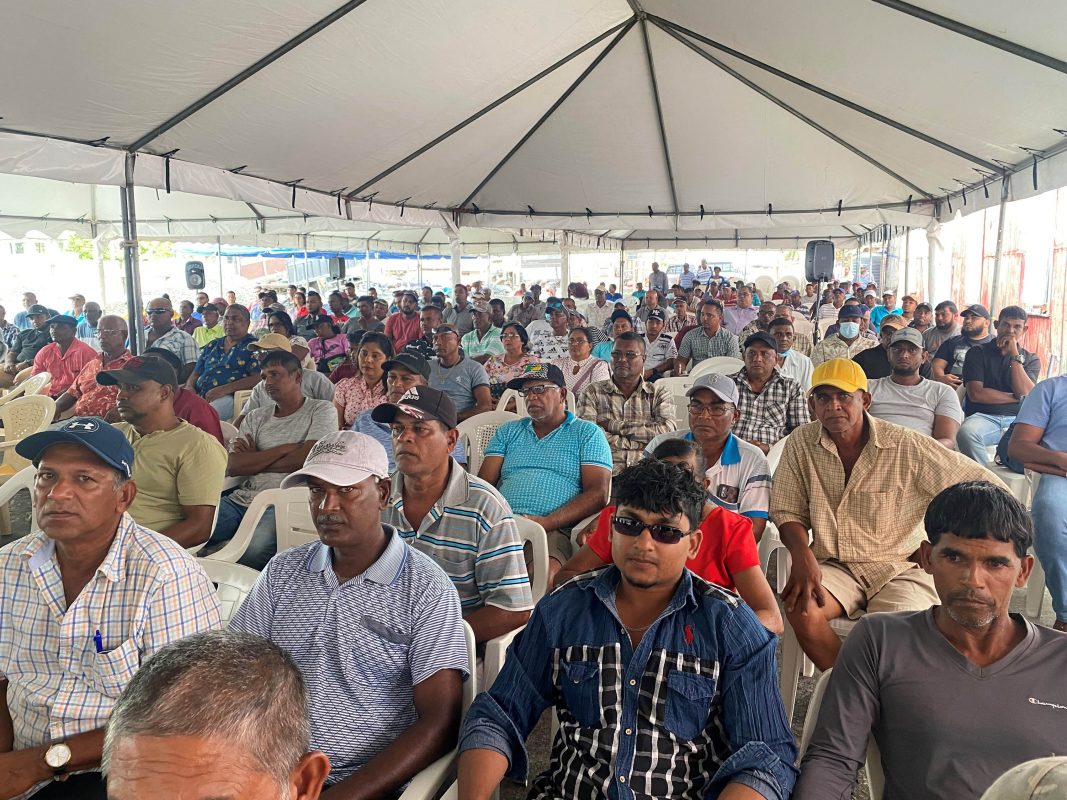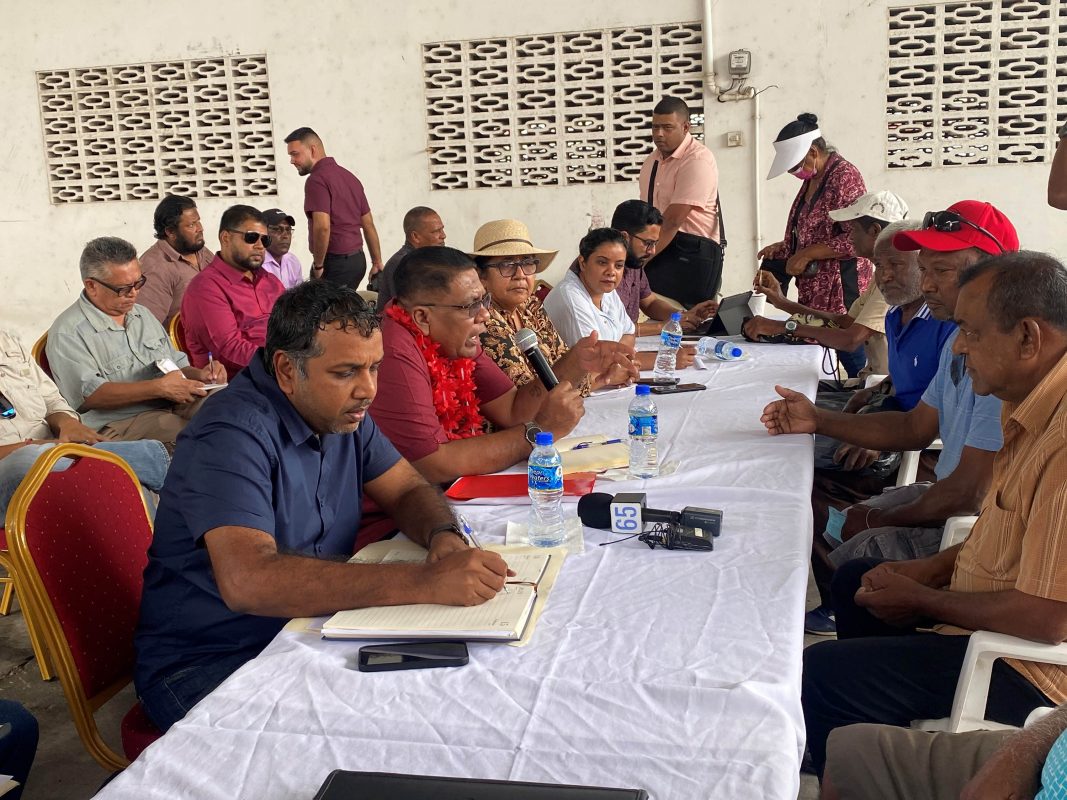Essequibo rice farmers yesterday demanded to know the price of paddy for this crop since harvesting is due to start within days in the Pomeroon-Supenaam region.
The rice farmers stood outside on the road waiting on the Minister of Agriculture, Zulfikar Mustapha with that one question on their minds.
The minister visited Pomeroon-Supenaam (Region Two) to conduct an outreach at the Rice Producers Association (RPA) bond at Anna Regina on the Essequibo coast. He spoke briefly with farmers and told them that he was there with his team to listen to their concerns individually and was accompanied by officers from various departments within the sector to address their issues.
However, as he called on them to raise their concerns, disgruntled rice farmers walked out saying that they wanted to air their problems publicly and went out and stood outside. Mustapha told those persons present that he had an agenda for the outreach and that he was there to have a one-on-one discussion with persons to listen to their concerns.
When this newspaper spoke with the rice farmers who had opted to stay outside, they said they came with one request in mind and that was to get more for their paddy. One rice farmer, Adrian Wellington, said that the last crop of paddy was sold for $4,000 per bag and already millers are offering $3,500 which in his mind is an unfair price.
“The question is a genuine one. We want to know what price we will be offered. This is the last crop, all we money done, we doing with trade [and] all we want is better price, that is all we asking. We always hearing that it’s a private business [but] we know Minister can fix this,” Wellington contended.
A large scale rice farmer, Fizul Khan, was also very vocal. He was standing outside and he said that he would be waiting for the minister outside. Khan cultivates 320 acres of rice lands. He related that right now, rice farmers are crying out for better prices.
“Presently it costs a rice farmer about $115,000 per acre to produce and last crop rice farmers only get $65,000. It is really hard on us, this government needs to do something.” Khan said.
Another large scale rice farmer, Kamrudeen Nesha, said that he cultivates 150 acres of rice. He noted that if the price for paddy does not increase then rice farmers will suffer. Many of them, he added, have loans to repay, and as such are calling on the minister to give them a cash grant to enable them to head back into the field.
“The contractor dem wha a build dem road and dem street know how much to build one road and how much to build one street but rice farmer…from de time yuh pick up plough and you go plough and yuh cut yuh paddy …you nah know what a bag you gon get”, an irate farmer said.
Another chimed in: “All a we a rice farmer got to (turn) contractor now…because nuff a dem aint got a tail and they getting contract”.
Some of the rice farmers who met with the minister were told that he will look into their request.
`We want cash grant’
President of the Essequibo Rice Farmers Development Committee, Tabindra Ramcharran, said that the farmers are calling for a grant. He disclosed that the committee is looking to establish a revolving fund so that cash- strapped farmers would be able to borrow money.
“Our biggest problem right now is money; we don’t have any and all was spending into the crop and we don’t even know if we will get the price to offset the production cost” Ramcharran said.
Another rice farmer, Khaleem Mohamed, said that he suffered losses last crop and as such decided to forego rice-planting and instead, opened a dump site on his land. However he is requesting financial assistance to further develop his land.
‘Rice cannot pay [so] I venture in something new but I need help from the government to develop my land,” Mohamed said.
Meanwhile, Mustapha assured those present that his ministry will be working with everyone to resolve their problems. He mentioned that his ministry is looking at ways of expanding the livestock sector so that more farmers can be involved. He added that his officers will be looking at each one of the problems and possible solutions will be offered.
“I am here to listen to your concerns, I am here to sit with you, all my officers are here and we will find a solution to your problem.”
February 7th
On February 7th, farmers from Regions Two, Three, Five and Six met with Mustapha to discuss some of the issues they faced in the industry.
A press release from the Ministry of Agriculture said that while noting that most of their issues are a result of unfavourable weather and external economic factors, the farmers called on the government to intervene in what they consider price gouging by suppliers of spare parts.
The farmers said that while the government has put systems in place, they are still paying high prices and, in some cases, VAT on spare parts.
“On the removal of VAT on spare parts, the government really do a good for us but the problem is we not feeling the effect. Everything raising. While these things are in place by the government the prices still high and growing every day. The issue is now between the government and the dealers because we know for a fact that the VAT is supposed to be deducted but it’s like it’s not. I bought a starter yesterday for $46,000. It used to be for $25,000. Look at the markup. Some of them still charging VAT. I have a receipt to prove it,” a farmer charged, according to the release.
Furthermore, the farmers told the minister that the price for paddy should be standard in every region since all farmers are faced with the same issues.
The release said that Mustapha explained that the government, since taking office has implemented a number of measures to aid farmers, the most recent being the $1 billion fertilizer assistance programme that was completed last year.
He said that although farmers are requesting an across-the-board price increase for paddy from millers, the government cannot institute this because transportation cost plays a significant role in the price for paddy in certain areas.
“We will continue to engage the millers on prices but I cannot promise an across-the-board price for paddy. For instance, in Region Two, the price to transport will be more than in Region Five so in order for millers to earn they take those factors into consideration. You know for a fact last year we were able to negotiate with millers from Region Two for better prices for farmers and now you are getting up to $4,000 per bag,” Mustapha said.








